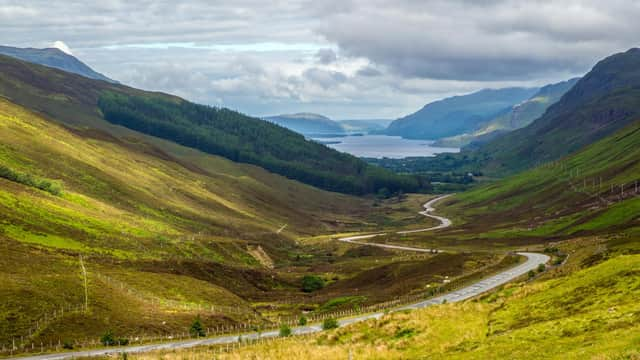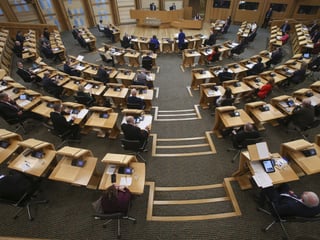Scottish tourism: How coronavirus pandemic has made us realise how vital it is – Murdo Fraser


In normal times, the Easter break would mark the start of the tourist season in Perthshire. With the fine weather we have been having over the past couple of weeks, the roads would be busy with cars, bicycles, campervans and caravans, hotels, B&Bs, campsites and self-catering units would be starting to fill up, and the tills ringing in restaurants, bars and shops in towns like Pitlochry. Paths and hills would see walkers and climbers; lochs and rivers both kayakers and fishermen.
What a difference we see this year, with the Covid-19 lockdown preventing the opening of all tourism-related businesses, including accommodation providers and attractions. Hotels are closed up, caravan parks and campsites have their gates padlocked shut, and there is hardly a person to be seen in the countryside.
Advertisement
Hide AdAdvertisement
Hide AdThere is an old saying that you only see the true value in something when it is gone, and that is certainly true for Scotland’s tourist industry. The economic footprint of a sector that is already Scotland’s largest employer is now more apparent than ever. It is not just the direct employment in hotels and other establishments that is being affected by the current restrictions – the loss of visitors is having a major economic impact right across rural Scotland, and the full effects are unlikely to be understood for many months yet.
Bob and Helen Brawn have owned and run the Bridge of Cally Post Office and Store for the last 17 years. Sitting on the busy A93 tourist route from Perth to Glenshee and Royal Deeside, in the summer months their shop is a popular stopping point.
They estimate that turnover increases by 50 per cent over the summer period, much of it due to impulse purchases such as soft drinks and ice cream from passers-by. In addition, a great deal of trade is generated from local caravan parks, both of which are now closed. This is just one example of a rural Scottish business, not directly involved in tourism, which will suffer a consequential impact from the lack of visitors.
Gaps in support for businesses
This story is repeated many times over – from distribution companies, from food suppliers, from laundries, from transport companies, all of whom will see a substantial downturn in business due to the effective closure on Scottish tourism.
Both UK and Scottish Governments have brought forward packages of support. The UK Chancellor’s furlough scheme will help larger businesses maintain employment. The provision of grants from the Scottish Government to smaller businesses, and suspension of all non-domestic rates payments for the current year, have also been welcomed in the sector.
But undoubtedly there are still gaps. The grants available from Scottish Government only apply to businesses with a rateable value up to £51,000. Any hotel, bar or restaurant with a rateable value even £1 above that figure will receive no direct payment, an issue which is causing a great deal of concern. And while the Scottish Government has moved on their original proposals to support self-catering businesses, and made them more generous than was originally proposed, there are still those in the sector losing out because they do not meet the strict criteria for support that have been applied.
Not surprisingly, there is a real worry as to the state that Scottish tourism will be in when this all comes to an end. This is a part of the economy overwhelmingly dependent upon small and medium-sized businesses spread throughout Scotland, but particularly focussed in rural areas where there are precious few other sources of income. The consequences for rural economies in particular if the industry cannot be supported will be devastating.
Holidays at home?
There are, perhaps, two positives we can take out of this for the future. The first is that we need to better understand the value that tourism brings to Scotland. It is only when we see that decline in incomes in related businesses that we truly understand the impact of a collapse in visitor numbers.
Advertisement
Hide AdAdvertisement
Hide AdIt is incredible to think that it is barely two months since we were talking about Scottish tourism in the context of the challenges the industry faced as a consequence of rapid growth. Parts of Scotland, like the Isle of Skye, and communities crossed by the North Coast 500, were complaining about “over-tourism”, and congestion in the peak summer months.
Beyond that, the industry’s main concern was the lack of availability of staff, a problem which could have been exacerbated by the UK Government’s original immigration proposals which sought to restrict the number of lower paid workers coming into the country. In the space of just a few weeks, the whole situation has been turned on its head. The problem today is not too few staff but too many; nor is it “over-tourism”, but the disappearance of tourists altogether.
There has been a historic problem in Scotland trying to encourage young people into a career in hospitality, being seen as an unglamorous, low-paid profession with unsocial hours. Maybe when we come through this we can see the true value of this vital industry, and demonstrate how working in it can provide secure fulfilling employment in an environment which showcases Scotland to visitors from across the world.
Secondly, when the lockdown finally ends, this is our opportunity to support Scottish tourism. I suspect there will be a general reluctance amongst many people to book overseas travel this summer, and with all that Scotland has to offer on our doorstep, surely it is just the right time for us to be taking holidays at home.
It always amazes me the number of Scottish people who have spent their summers on various Mediterranean beaches, but have never ventured to far-flung parts of their own country. It might just be a positive outcome from the current troubles of the industry if in the summer of 2020, assuming circumstances allow, more Scots decide to take holidays at home and make up for those from overseas who are unlikely to travel this year.
Scottish tourism has made an enormous economic contribution to our country over many years. Now we, though our Governments, and as individuals, have to repay that debt.
Murdo Fraser is a Scottish Conservative MSP for Mid Scotland and Fife
Comments
Want to join the conversation? Please or to comment on this article.
